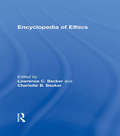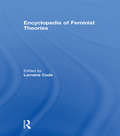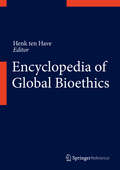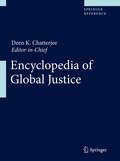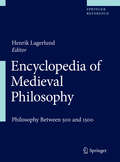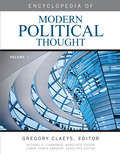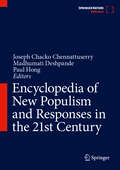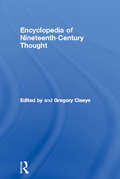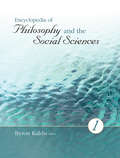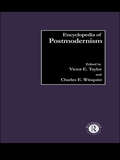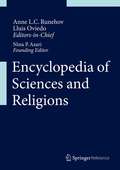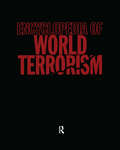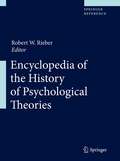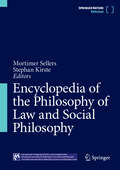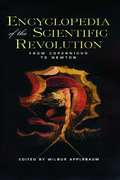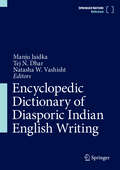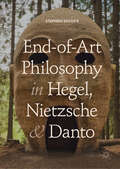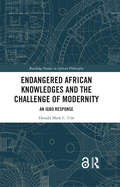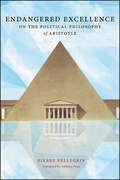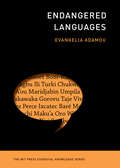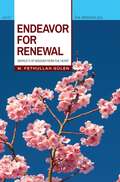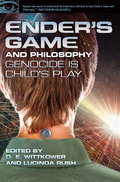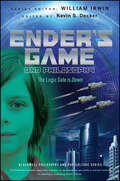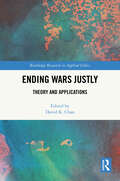- Table View
- List View
Encyclopedia of Ethics
by Lawrence C. Becker Charlotte B. BeckerThe editors, working with a team of 325 renowned authorities in the field of ethics, have revised, expanded and updated this classic encyclopedia. Along with the addition of 150 new entries, all of the original articles have been newly peer-reviewed and revised, bibliographies have been updated throughout, and the overall design of the work has been enhanced for easier access to cross-references and other reference features. New entries include * Cheating * Dirty hands * Gay ethics * Holocaust * Journalism * Political correctness * and many more.
Encyclopedia of Feminist Theories
by Lorraine CodeThe path-breaking Encyclopedia of Feminist Theories is an accessible, multidisciplinary insight into the complex field of feminist thought. The Encyclopedia contains over 500 authoritative entries commissioned from an international team of contributors and includes clear, concise and provocative explanations of key themes and ideas. Each entry contains cross references and a bibliographic guide to further reading; over 50 biographical entries provide readers with a sense of how the theories they encounter have developed out of the lives and situations of their authors.
Encyclopedia of Global Bioethics
by Henk Ten HaveThis work presents the first comprehensive and systematic treatment of all relevant issues and topics in contemporary global bioethics. Now that bioethics has entered into a novel global phase, a wider set of issues, problems and principles is emerging against the backdrop of globalization and in the context of global relations. This new stage in bioethics is furthermore promoted through the ethical framework presented in the UNESCO Universal Declaration on Bioethics and Human Rights adopted in 2005. This Declaration is the first political statement in the field of bioethics that has been adopted unanimously by all Member States of UNESCO. In contrast to other international documents, it formulates a commitment of governments and is part of international law (though not binding as a Convention). It presents a universal framework of ethical principles for the further development of bioethics at a global level. The Encyclopedia of Global Bioethics caters to the need for a comprehensive overview and systematic treatment of all pertinent new topics and issues in the emerging global bioethics debate. It provides descriptions and analysis of a vast range of important new issues from a truly global perspective and with a cross-cultural approach. New issues covered by the Encyclopedia and neglected in more traditional works on bioethics include, but are not limited to, sponsorship of research and education, scientific misconduct and research integrity, exploitation of research participants in resource-poor settings, brain drain and migration of healthcare workers, organ trafficking and transplant tourism, indigenous medicine, biodiversity, commodification of human tissue, benefit sharing, bio industry and food, malnutrition and hunger, human rights and climate change.
Encyclopedia of Global Justice
by Deen K. ChatterjeeThis two-volume Encyclopedia of Global Justice, published by Springer, along with Springer's book series, Studies in Global Justice, is a major publication venture toward a comprehensive coverage of this timely topic. The Encyclopedia is an international, interdisciplinary, and collaborative project, spanning all the relevant areas of scholarship related to issues of global justice, and edited and advised by leading scholars from around the world. The wide-ranging entries present the latest ideas on this complex subject by authors who are at the cutting edge of inquiry. The Encyclopedia sets the tone and direction of this increasingly important area of scholarship for years to come. The entries number around 500 and consist of essays of 300 to 5000 words. The inclusion and length of entries are based on their significance to the topic of global justice, regardless of their importance in other areas.
Encyclopedia of Medieval Philosophy
by Henrik LagerlundResearch on medieval philosophy has advanced greatly in the last thirty years, but there has not been a comprehensive encyclopedia summarizing the current research available. This two-volume reference work fills that void. The Encyclopedia of Medieval Philosophy covers all areas of philosophy in the Middle Ages and part of the Renaissance, ranging from 500 to 1500 CE. It contains general entries on medieval philosophers and medieval philosophies and on the key terms and concepts in the subject area, but it also provides more in-depth details and analyses of particular theories. Furthermore, in order to gain an insight into the social and cultural context of the material, entries are included on the teaching of philosophy, the career of philosophers, and the place of philosophy within the universities. Complete with cross-references between key words and related essays to enable efficient searches, this Encyclopedia is exhaustive, unprecedented, and user-friendly. It is indispensable for scholars of medieval philosophy and of the history of ideas, and it is also useful for anyone interested in medieval ideas and thought.
Encyclopedia of Modern Political Thought (set)
by Gregory ClaeysThis groundbreaking new work explores modern and contemporary political thought since 1750, looking at the thinkers, concepts, debates, issues, and national traditions that have shaped political thought from the Enlightenment to post-modernism and post-structuralism. Encyclopedia of Modern Political Thought is two-volume A to Z reference that provides historical context to the philosophical issues and debates that have shaped attitudes toward democracy, citizenship, rights, property, duties, justice, equality, community, law, power, gender, race, and legitimacy over the last three centuries. It profiles major and minor political thinkers, and the national traditions, both Western and non-Western, which continue to shape and divide political thought. More than 200 scholars from leading international research institutions and organizations have provided signed entries that offer comprehensive coverage of: Thought of regions and countries, including African political thought, American political thought , Australasian political thought (Australian and New Zealand), Chinese political thought, Indian political thought, Islamic political Thought, Japanese political thought, and more Thought regarding contemporary issues such as abortion, affirmative action, animal rights, European integration, feminism, humanitarian intervention, international law, race and racism, and more The ideological spectrum from Marxism to neoconservatism, including anarchism, conservatism, Darwinism and Social Darwinism, Engels, fascism, the Frankfurt School, Lenin and Leninism, socialism, and more Connections of political thought to key areas of politics and other disciplines such as economics, psychology, law, and religion Notable time periods of political thought since 1750 Concepts including class, democratic theory, liberalism, nationalism, natural and human rights, and theories of the state Theorists and political intellectuals, both Western and non-Western including John Adams, Edmund Burke, Mohandas Gandhi, Immanuel Kant, Ayatollah Khomeini, Ernst Friedrich Schumacher, George Washington, and Mary Wollstonecraft
Encyclopedia of Modern Political Thought (set)
by Gregory ClaeysThis groundbreaking new work explores modern and contemporary political thought since 1750, looking at the thinkers, concepts, debates, issues, and national traditions that have shaped political thought from the Enlightenment to post-modernism and post-structuralism. Encyclopedia of Modern Political Thought is two-volume A to Z reference that provides historical context to the philosophical issues and debates that have shaped attitudes toward democracy, citizenship, rights, property, duties, justice, equality, community, law, power, gender, race, and legitimacy over the last three centuries. It profiles major and minor political thinkers, and the national traditions, both Western and non-Western, which continue to shape and divide political thought. More than 200 scholars from leading international research institutions and organizations have provided signed entries that offer comprehensive coverage of: Thought of regions and countries, including African political thought, American political thought , Australasian political thought (Australian and New Zealand), Chinese political thought, Indian political thought, Islamic political Thought, Japanese political thought, and more Thought regarding contemporary issues such as abortion, affirmative action, animal rights, European integration, feminism, humanitarian intervention, international law, race and racism, and more The ideological spectrum from Marxism to neoconservatism, including anarchism, conservatism, Darwinism and Social Darwinism, Engels, fascism, the Frankfurt School, Lenin and Leninism, socialism, and more Connections of political thought to key areas of politics and other disciplines such as economics, psychology, law, and religion Notable time periods of political thought since 1750 Concepts including class, democratic theory, liberalism, nationalism, natural and human rights, and theories of the state Theorists and political intellectuals, both Western and non-Western including John Adams, Edmund Burke, Mohandas Gandhi, Immanuel Kant, Ayatollah Khomeini, Ernst Friedrich Schumacher, George Washington, and Mary Wollstonecraft
Encyclopedia of New Populism and Responses in the 21st Century
by Paul Hong Joseph Chacko Chennattuserry Madhumati DeshpandeThis book mainly seeks to explain, define and update the recurring forms of populism in the 21st century. Examples used in this Introduction are limited to English speaking countries. But populism's existent expressions are ecumenically global. Like any long-lasting perennial organism it is sturdy and comes in a variety of forms adaptable to environmental changes. In political or cultural terms its expression has been neither exclusively left, center, nor right. Populism contains multitudes, dates back centuries before it was identified with its modern name. Populism has become a hot button issue in the recent times. The UK's Sunday heavy The Guardian published about 300 articles in 1998 that used the term "populism" or "populist" and by 2016 its use had skyrocketed to over 2,000. And growing. Probably the single greatest catalyst to date that injected populism into the world's Internet common discourse, that infused it into journalism right, left and centerand awakened populist political activism was the Great Recession of 2007-08 and the subsequent global deprivations it engendered. In today's world populism promises to remain and renew its intensity due to the covid-19 pandemic's deleterious effects on most nations middle and low-income groups, specially minorities. These are some reasons among many why it is time for populism to be relocated, identified and given refreshed 21st understandings. It has a shifting nature among people, events, causes that constantly demands fresh studies. It is a social and cultural phenomenon both universal and particular. In our 21st century world it is a product of our shared cultures and each our own exceptional deep culture. This Encyclopedia is unique in its composition as it includes all the major disciplines of Social Sciences and thus will be a one stop source of nine different disciplines looking at new populism.
Encyclopedia of Nineteenth Century Thought
by Gregory ClaeysEncyclopedia of Nineteenth Century Thought provides essential information on, and a critical interpretation of, nineteenth-century thought and nineteenth-century thinkers. The project takes as its temporal boundary the period 1789 to 1914. Encyclopedia of Nineteenth Century Thought primarily covers social and political thinking, but key entries also survey science, religion, law, art, concepts of modernity, the body and health, and so on, and thereby take into account all of the key developments in the intellectual history of the period. The encyclopedia is alphabetically organized, and consists of:* principal entries, divided into ideas (4000 words) and persons (2500 words)* subsidiary entries of 1000 words, which are entirely biographical* informational entries of 500 words, which are also biographical.
Encyclopedia of Philosophy and the Social Sciences
by Byron Kaldis"This encyclopedia, magnificently edited by Byron Kaldis, will become a valuable source both of reference and inspiration for all those who are interested in the interrelation between philosophy and the many facets of the social sciences. A must read for every student of the humanities." Wulf Gaertner, University of Osnabrueck, Germany "Like all good works of reference this Encyclopedia of Philosophy and the Social Sciences is not to be treated passively: it provides clear and sometimes controversial material for constructive confrontation. It is a rich resource for critical engagement. The Encyclopedia conceived and edited by Byron Kaldis is a work of impressive scope and I am delighted to have it on my bookshelf.” David Bloor, Edinburgh University "This splendid and possibly unique work steers a skilful course between narrower conceptions of philosophy and the social sciences. It will be an invaluable resource for students and researchers in either or both fields, and to anyone working on the interrelations between them." William Outhwaite, Newcastle University The Encyclopedia of Philosophy and the Social Sciences is the first of its kind in bringing the subjects of philosophy and the social sciences together. It is not only about the philosophy of the social sciences but, going beyond that, it is also about the relationship between philosophy and the social sciences. The subject of the Encyclopedia is purposefully multi- and inter-disciplinary. Knowledge boundaries are both delineated and crossed over. The goal is to convey a clear sense of how philosophy looks at the social sciences and to mark out a detailed picture of how the two are interrelated: interwoven at certain times but also differentiated and contrasted at others. The Entries cover topics of central significance but also those that are both controversial and on the cutting-edge, underlining the unique mark of this Encyclopedia: the interrelationship between philosophy and the social sciences, especially as it is found in fresh ideas and unprecedented hybrid disciplinary areas. The Encyclopedia serves a further dual purpose: it contributes to the renewal of the philosophy of the social sciences and helps to promote novel modes of thinking about some of its classic problems.
Encyclopedia of Postmodernism
by Victor E. Taylor Charles E. WinquistThe Encyclopedia of Postmodernism provides comprehensive and authoritative coverage of academic disciplines, critical terms and central figures relating to the vast field of postmodern studies. With three cross-referenced sections, the volume is easily accessible to readers with specialized research agendas and general interests in contemporary cultural, historical, literary and philosophical issues.Since its inception in the 1960s, postmodernism has emerged as a significant cultural, political and intellectual force that many scholars would argue defines our era. Postmodernism, in its various configurations, has consistently challenged concepts of selfhood, knowledge formation, aesthetics, ethics, history and politics. This Encyclopedia offers a wide-range of perspectives on postmodernism that illustrates the plurality of this critical concept that is so much part of our current intellectual debates. In this regard, the volume does not adhere to a single definition of postmodernism as much as it documents the use of the term across a variety of academic and cultural pursuits.The Encyclopedia of Postmodernism, it must be noted, resists simply presenting postmodernism as a new style among many styles occuring in the post-disciplinary academy. Documenting the use of the term acknowledges that postmodernism has a much deeper and long-lasting effect on academic and cultural life. In general, the volume rests on the understanding that postmodernism is not so much a style as it is an on-going process, a process of both disintegration and reformation.
Encyclopedia of Sciences and Religions
by Anne Runehov Lluis OviedoThe Encyclopedia of Sciences and Religions will map the (self-)identities of current and prospective participants in a scholarly area 'Science and Religion' - i.e., all academic disciplines, religious traditions, across all cultures - by implicitly drawing out from each how it sees itself in relation to the conceptual domains of 'Science' and 'Religion', how each, within its own disciplinary/tradition bounds, treats a set of key issues/themes/concepts that have thus far emerged as central to the area 'Science and Religion', and also additional issues/themes/concepts that are seen to be of relevance to 'Science and Religion' engagement as seen from the perspective of each potential participant therein. Special entries will be devoted to key thinkers and key concepts in the field. The Encyclopedia will provide not only a comprehensive, up-to-date picture of how a so-called 'Science and Religion' discourse/dialogue has thus far been treated, but as well, a starting point for new lines of inquiry, and an invitation for fresh perspectives on the possibilities for engagement between and across sciences and religions.
Encyclopedia of World Terrorism
by Martha Crenshaw John PimlottThis three-volume reference on terrorism in the 20th century places this growing phenomenon in the context of modern history. It provides students with both detailed information and the historical perspective tie terrorism to the high school and college curriculum. "Volume 1" defines terrorism, explores the historical perspective from the dawn of Western Civilisation through World War II, and discusses specific activities of modern terrorist groups. "Volume 2" focuses on the developing world, with emphasis on the Middle East (including the 1996 peace process). "Volume 3" explores terrorism and responses to terrorism in the developed world. This volume covers the United States, Europe, Israel, Britain, Central and South America and concludes with a chronology of major terrorist events since 1945, an A-Z listing of terrorist groups and leaders, and a select bibliography.
Encyclopedia of the History of Psychological Theories
by Robert W. RieberThis work will survey the entire range of thinking in psychology, from ancient times to the present, encompassing philosophies and theories of mind that pre-date our modern conception of psychology as a science, and extending to the current findings of neuroscience. It will set the theories into their historical context and cross-reference key influences, such as Darwin's on Freud. Fifteen hundred entries will comprise key figures, theoretical concepts, false theories, historical events, and seminal writings. International in scope, this project will involve history of psychology experts from around the world and the coverage of topics will be set in global context. The aim will be to provide a reference work of more depth than discussions that are currently available in textbooks, with the ability to connect to a multitude of relevant topics. This work will provide a picture of psychology as it has emerged into the present time and position it among other related fields such as anthropology, sociology, philosophy, and medicine.
Encyclopedia of the Philosophy of Law and Social Philosophy: Volume 3: From Ross To Dworkin And Beyond (Studies In The History Of Law And Justice Ser. #24)
by Mortimer Sellers Stephan KirsteThis encyclopedia covers all topics in the philosophy of law and social philosophy, including the history, theory, and leading theorists in both fields. Featuring specially commissioned entries by an international team of the world's most respected scholars, including more than 700 entries ensuring its place as the definitive reference work on the Philosophy of Law and Social Philosophy.The encyclopedia provides: 1) a clear concise expert definition and explanation of the key concepts in the field, written by leading scholars; 2) an essential reference for experts and newcomers alike, with entries ranging from short definitions of key terms to extended explorations of major topics; 3) an investigation of questions that have traditionally defined the field, but also more recent developments, significantly updating the fields of the philosophy of law and social philosophy; 4) introductions to theories and research developed in all the world's languages and legal traditions.
Encyclopedia of the Scientific Revolution: From Copernicus to Newton
by Wilbur ApplebaumWith unprecedented current coverage of the profound changes in the nature and practice of science in sixteenth- and seventeenth-century Europe, this comprehensive reference work addresses the individuals, ideas, and institutions that defined culture in the age when the modern perception of nature, of the universe, and of our place in it is said to have emerged. Covering the historiography of the period, discussions of the Scientific Revolution's impact on its contemporaneous disciplines, and in-depth analyses of the importance of historical context to major developments in the sciences, The Encyclopedia of the Scientific Revolution is an indispensible resource for students and researchers in the history and philosophy of science.
Encyclopedic Dictionary of Diasporic Indian English Writing
by Manju Jaidka Tej N. Dhar Natasha W. VashishtThe Handbook of Diasporic Indian Writing in English is an essential reference to Indian literature. It features alphabetical entries of Indian writers who have bridged the gap between cultures and redefined language boundaries. As the field of diasporic writing continues to expand and intersect with various branches of English and Cultural studies, it anticipates a growing market. It offers a unique and compelling perspective on the global tapestry of literature. It draws on various interdisciplinary approaches, including postcolonial theory, cultural studies, and digital humanities, to offer fresh and innovative perspectives on the literature. It is an indispensable resource for research scholars of literary studies and related disciplines, like cultural studies and postcolonial studies.
End-of-Art Philosophy in Hegel, Nietzsche and Danto
by Stephen SnyderThis book examines the little understood end-of-art theses of Hegel, Nietzsche, and Danto. The end-of-art claim is often associated with the end of a certain standard of taste or skill. However, at a deeper level, it relates to a transformation in how we philosophically understand our relation to the ‘world’. Hegel, Nietzsche, and Danto each strive philosophically to overcome Cartesian dualism, redrawing the traditional lines between mind and matter. Hegel sees the overcoming of the material in the ideal, Nietzsche levels the two worlds into one, and Danto divides the world into representing and non-representing material. These attempts to overcome dualism necessitate notions of the self that differ significantly from traditional accounts; the redrawn boundaries show that art and philosophy grasp essential but different aspects of human existence. Neither perspective, however, fully grasps the duality. The appearance of art’s end occurs when one aspect is given priority: for Hegel and Danto, it is the essentialist lens of philosophy, and, in Nietzsche’s case, the transformative power of artistic creativity. Thus, the book makes the case that the end-of-art claim is avoided if a theory of art links the internal practice of artistic creation to all of art’s historical forms.
Endangered African Knowledges and the Challenge of Modernity: An Igbo Response (Routledge Studies in African Philosophy)
by Donald Mark UdeThis book presents an innovative African philosophical response to coloniality and the attendant epistemicide of Africa’s knowledge systems, drawing on Igbo thinking.This book argues that theorizing modernity requires a critical conversation between African and Western scholarship, in order to unpack its links with coloniality and the subjugation of Africa’s indigenous knowledges. In setting out this discussion, the book also connects with Latin American scholarship, demonstrating how the modern world is structured to marginalize and destroy knowledges from across the Global South. This book draws on Igbo epistemic resources of solidarity thinking, positioned in contrast to capitalist knowledge-patterns, thereby providing an important Africa-driven response to modernity and coloniality. This book concludes by arguing that the Igbo sense of solidarity is useful and relevant to modern contexts and thus constitutes a vital resource for a less disruptive, more balanced, and more wholesome modernity.At a time of considerable global crises, this book makes an important contribution to philosophy both within Africa and beyond.
Endangered Excellence: On the Political Philosophy of Aristotle (SUNY series in Ancient Greek Philosophy)
by Pierre PellegrinIn Endangered Excellence, Pierre Pellegrin provides a fresh interpretation of Aristotle's Politics, revealing the extent to which Aristotle diverged from other ancient writers on politics, and the extent to which many of his positions resemble modern attitudes in political philosophy. Pellegrin highlights a number of strikingly original positions in his thought. Aristotle took humans to be inherently political, for example, even as he believed this characteristic developed more completely in men than in women, and in Greeks more than in barbarians. He maintained a nuanced and flexible conception of the way that cities ought to develop their constitutions, one that would be responsive to their particular social and historical contexts. Realist enough to recognize that virtuous men are rare and that class conflict is inevitable, Aristotle envisioned a political system that would be resilient in navigating the choppy waters of civic life. With this original approach to Aristotle's Politics, and incorporating key developments in European and English-language scholarship on the subject, Pellegrin demonstrates Aristotle's important and often unrecognized innovations in understanding political life.
Endangered Languages: Insights From Endangered Languages (The MIT Press Essential Knowledge series #12)
by Evangelia AdamouA concise, accessible introduction to language endangerment and why it is one of the most urgent challenges of our times.58% of the world’s languages—or, approximately 4,000 languages—are endangered. When we break this figure down, we realize that roughly ten percent of languages have fewer than ten language keepers. And, if one language stops being used every three months, this means that in the next 100 years, if we do nothing, 400 more languages will become dormant. In Endangered Languages, Evangelia Adamou, a specialist of endangered languages and a learner of her own community language, Nashta, offers a sobering look at language endangerment and what is truly lost when a language disappears from usage.Combining recent advances from the Western scientific tradition—from the fields of linguistics, psycholinguistics, neurolinguistics, language attrition, population genetics, and natural language processing—and insights from Indigenous epistemology, theory, and ethics, Adamou examines a wealth of issues surrounding endangered languages. She discusses where endangered languages are found, including how they are faring in a digital world, why these languages are no longer used, and how communities can reclaim languages and keep them strong. Adamou also explains the impact of language continuity on community and individual health and well-being, the importance of language transmission in cultural transmission, and why language rights are essentially human rights.Drawing on varied examples from the Wampanoag Nation to Wales, Endangered Languages offers a powerful reminder of the crucial role every language has in the vitality and well-being of individuals, communities, and our world.
Endeavor for Renewal
by M. Fethullah GulenTrue renewal is realized by retaining the purity of the seed and the root, and by synthesizing an entire inheritance of values with new thoughts and wisdom appropriate to the age. A thorough revival can only be realized with the efforts of the spirit, intellect, feelings, and willpower working in concert. Utilizing the spirit&’s power to the fullest, making flawless use of the knowledge inherited from the past, being constantly open to spiritual breezes of inspiration, not being trapped by blind imitation, and always following a sound methodology are some dynamics of an ideal renewal.The vigorous souls with steel willpower must keep running on the path of serving humanity with an insatiable love for research, an ever-evolving passion for knowledge of God, and an otherworldly profundity beyond comprehension. This book conveys the feelings and thoughts of a person who has dedicated his life for the coming of such a generation and who suffers, in heart and mind, for this noble ideal.
Ender's Game and Philosophy
by D. E. Wittkower Lucinda RushEnder's Game, Orson Scott Card's award-winning 1985 novel, has been discovered and rediscovered by generations of science fiction fans and young adult readers, banned and challenged in schools, assigned in high school English classes, and adopted as reading by the US Marine Corps. Ender's Game and its sequels explores rich themes-the violence and cruelty of children, the role of empathy in war, and the balance of individual dignity and the social good-with compelling elements of a coming-of-age story and exciting and immersive battle scenes.Ender's Game and Philosophy brings together over thirty philosophers to engage in wide-ranging discussion on the troubling, exciting, and fascinating issues raised in and amidst the excitement and fear of Orson Scott Card's novels and Gavin Hood's film.Authors address issues such as:the justifiability of pre-emptive strikes, how Ender's disconnected and dispassionate violence is mirrored in today's drone warfare, whether the end of saving the species can justify the most brutal means, the justifiability of lies and deception in wartimes, how military schools produce training in virtue, how Ender as the "good student" is held to a different educational standard, which rules can be broken in games and which cannot, Ender's world as a mirror of our own surveillance society, the moral hazards of child warriors, the value of Ender's ability to sympathize with his enemies, the meaning of a "hive-mind," the limits of our ability to relate to one, the relationship between Ender's story and Card's Mormonism.The authors of Ender's Game and Philosophy challenge readers to confront and work through the conceptual and emotional challenges that Ender's Game presents, bringing a new light on the idea of a just war, the virtues of the soldier, the nature of childhood, the social value and moral corruption of lies and deception, the practices of education and of leadership, and the serious work of playing games.
Ender's Game and Philosophy
by William Irwin Kevin S. DeckerA threat to humanity portending the end of our species lurks in the cold recesses of space. Our only hope is an eleven-year-old boy.Celebrating the long-awaited release of the movie adaptation of Orson Scott Card's novel about highly trained child geniuses fighting a race of invading aliens, this collection of original essays probes key philosophical questions raised in the narrative, including the ethics of child soldiers, politics on the internet, and the morality of war and genocide.Original essays dissect the diverse philosophical questions raised in Card's best-selling sci-fi classic, winner of the Nebula and Hugo Awards and which has been translated in 29 languagesPublication coincides with planned release of major motion picture adaptation of Ender's Game starring Asa Butterfield and Harrison FordTreats a wealth of core contemporary issues in morality and ethics, including child soldiers, the best kind of education and the use and misuse of global communications for political purposesA stand-out addition to the Blackwell Philosophy and Pop Culture series
Ending Wars Justly: Theory and Applications (Routledge Research in Applied Ethics)
by David K. ChanThis volume features original essays on the ethics of ending wars (jus ex bello). It fills a significant gap in just war theory and sets the stage for other thinkers to engage with the topic.What makes questions about jus ex bello especially difficult for ethicists to answer is that the just war tradition has neglected to develop principles for ending wars justly. Until recently, debates have primarily focused on justice in going to war (jus ad bellum), justice in fighting a war (jus in bello), and justice after war (jus post bellum). Additionally, many contemporary conflicts are unconventional and not the kind that the traditional principles of just war theory are designed to address. The chapters in this volume address the question of how and when wars can end justly. Part 1 approaches jus ex bello from different theoretical angles, including just war theory, virtue ethics, pacifism, and feminism. Part 2 discusses specific aspects of recent wars: the United States' withdrawal from Afghanistan after 20 years of military involvement in the country, and the war that began with the Russian invasion of Ukraine in 2022, that is so difficult to end despite the escalating human cost.Ending Wars Justly is an essential resource for scholars and advanced students working in just war theory, the ethics of war and peace, international relations, and military and strategic studies.
